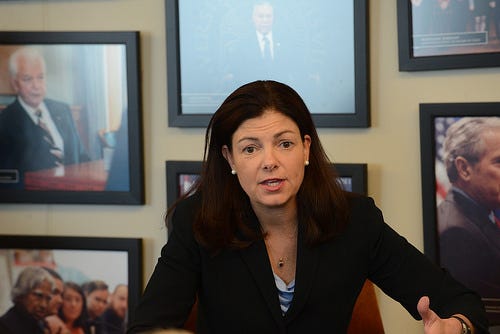Shots fired: GOP activists target Kelly Ayotte with proposed changes to nominating process

Republican activists, angered that Sen. Kelly Ayotte opposed Rep. Bill O'Brien’s successful bid for House Speaker, are retaliating with a plan to change the way New Hampshire candidates for the U.S. Senate are nominated.
Rep. George Lambert (R-Litchfield) is leading the effort, which he says is the “first attack” in a Republican “civil war” involving the party establishment, libertarians and social conservatives.
“Kelly Ayotte the war for the NHGOP is coming to you and your friends,” Lambert wrote in an online comment. “I was told that you threatened retaliation for any republican that opposed you. As John Hancock said when signing the declaration of independence, ‘There, I guess King George will be able to see that… ’ I have tried to send a similar message to Kelly Ayotte, and Friends,” Lambert continued. “I’M COMING FOR YOU.”
The activists plan to introduce legislation in the New Hampshire House that would insert the state legislature into the nominating process for the U.S. Senate. The proposed legislation is a reintroduction of a bill that was rejected by the GOP-led House in 2012.
House Bill 1126, sponsored by the late Robert Kingsbury (R-Laconia), would have required members of the Democratic and Republican caucuses in the state’s two legislative chambers to each nominate a candidate for the primary. The one or two candidates nominated by legislators would be the only names appearing on each party’s primary ballot for U.S. Senate, though write-in votes would be permitted.
The 2012 bill went down to defeat in a voice vote by the House after the Election Law Committee rejected it by a 14-1 margin. In the committee report, Republican Rep. Joseph Thomas noted the majority of the committee believed the proposal was unconstitutional.
South Texas College of Law Professor Charles “Rocky” Rhodes agrees. In federal elections, he says, a state can only regulate the time, place and manner of the election. “And it seems to me if you have, essentially, a state-endorsed candidate,” he told Houston Public Media, “that could run afoul of that prohibition of the state favoring a particular candidate with respect to their election laws.”
U.S. senators were selected by state legislators until 1913 when the 17th Amendment to the Constitution was adopted. Repeal of the 17th Amendment, which established the direct election of senators by popular vote, has become a rallying cry for Tea Party conservatives who say it would right an imbalance between states and the federal government.
Legislation similar to HB 1126, which has been called a “soft repeal” of the 17th Amendment, has been proposed in Tennessee and Indiana. Last year, the American Legislative Exchange Council considered putting its weight behind the effort before rejecting the initiative as “not germane to ALEC’s mission of free markets, limited government and federalism.”
Two of the original co-sponsors of HB 1126 will be members of the House when it meets for the new session: Free Stater Rep. Dan McGuire (R-Epsom) and Rep.-elect Susan DeLemus (R-Rochester), who gained notoriety in the birther attempt to keep President Obama off the ballot for the New Hampshire primary.
Lambert promises to lead “an active effort to raise money to fund and pass” the legislation. “This is a fight for the heart of the Future of the Republican Party – not just in New Hampshire – but across the nation,” he writes. “The only option is to fight them by their own rules, and bring the war to them.”


